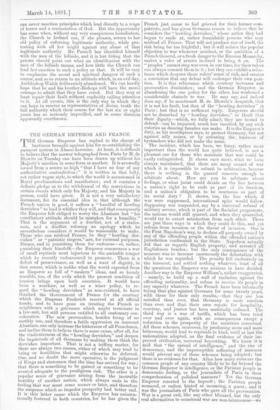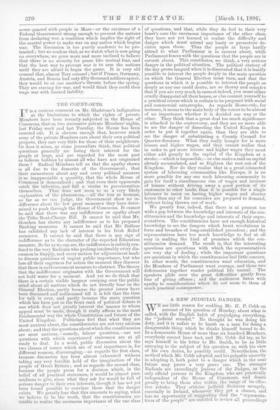THE GERMAN EMPEROR AND FRANCE. T HE German Emperor has replied
to the charge of hastiness brought against him for re-establishing the passport system in Alsace-Lorraine. At least, it is difficult to believe that the answer telegraphed from Paris by M. de Blowitz on Tuesday can have been drawn up without his Majesty's sanction in some form or another. It is avowedly issued from a source so high "that I have no fear of any authoritative contradiction ;" it is written in that lofty, yet rather vague style, to which the world is accustomed in Royal proclamations and manifestoes ; and it contains a definite pledge as to the withdrawal of the restrictions in certain events which only his Majesty, and his Majesty in person, could have given. It is not a very satisfactory document, for its essential idea is, that although the French nation is good, it suffers a " handful of howling dervishes " to lead it whither they will, and that consequently the Emperor felt obliged to worry the Alsatians lest " his conciliatory attitude should be mistaken for a humility." That is the argument of a duellist, not of a states- man, and a duellist refusing an apology which he nevertheless considers it would be reasonable to make. Those who can mislead France, be they " howling der- vishes" or "patriotic singers," are, for external purposes, France, and in punishing them for rudeness—or, rather, punishing their kinsfolk—the Emperor commences a war of small reprisals most injurious to the amicable temper which he recently endeavoured to promote. There is a defect of perseverance, as well as a want of dignity, in that course, which is unlike what the world expected from an Emperor so full of " modern " ideas, and so keenly sensible, too, of the evils which the present condition of tension brings upon both countries. It would have been a worthier, as well as a wiser policy, to re- gard the " howling dervishes " as non-existent, to have thanked the Government of France for the courtesy which the Empress Frederick received at all official hands, and to have gone on treating the French as neighbours with a grievance which might terminate in a. law-suit, but still persons entitled to all customary con- sideration. The new provocation, besides being of no earthly use, and therefore a futile oppression on innocent Alsatians, can only increase the bitterness of all Frenchmen, and incline them to believe there is some cause, after all, for the vindictiveness of the " howling dervishes," and deepen the inquietude of all Germans by making them think the dervishes important. That is not a trifling matter, for there are always two causes, either of which may tend to bring on hostilities that might otherwise be deferred. One, and no doubt the more operative, is the judgment of Kings and statesmen that the time has arrived for war ; that there is something to be gained or something to be averted adequate to the prodigious risk. The other is a popular sense of grievance arising from the incurable hostility of another nation, which always ends in the feeling that war must come sooner or later, and therefore the suspense which so impedes prosperity had better end. It is this latter cause which the Emperor has uninten- tionally fostered in both countries, for he has given the French just cause to feel grieved for their former com- patriots, and has given Germans reason to believe that he considers the " howling dervishes," whose antics they had begun to smile at, rather formidable persons who may mislead all France. That will not produce war of itself, the risk being far too frightful ; but it will reduce the popular objection to war whenever accident, or the ambition of a French General, or a fresh danger to the Russian Monarchy, makes a ruler of armies inclined to bring it on. The " peoples " cannot stop war even in our time, for their rulers can always commit them to it ; but they can exhibit a reluc- tance which deepens those rulers' sense of risk, and creates a conviction that any defeat will endanger their own posi- tion. It is this reluctance which courtesy increases and provocation diminishes ; and the German Emperor, in abandoning the one policy for the other, has weakened a considerable obstacle to war. He may say, and indeed does say, if he sanctioned M. de Blowitz's despatch, that it is not his fault, but that of the " howling dervishes " in Paris ; but that is no sufficient reply. Emperors should not be disturbed by " howling dervishes," or think that their dignity—which, we fully admit, they are bound to defend—can be impaired, much less insulted, by any such outcries as dancing fanatics can make. It is the Emperor's duty, as his mouthpiece says, to protect Germany, but not against silly noises, or by arresting the ,. business of bystanders who did not make the noise.
The incident, which has been, we fancy, rather more important than the world has quite believed, is not a pleasant one for those who maintain that war could be easily extinguished. It shows once more, what we have always maintained, that there are many causes of war which it is impossible to submit to arbitration, because there is nothing in the quarrel concrete enough to arbitrate about. How are you to arbitrate about feelings, or what jurist could decide on the line between a nation's right to be rude as part of its freedom, and a nation's obligation to be courteous as part of its social duty ? It shows, too, the line which, if war were suppressed, international spite would follow. Supposing war suspended, say by a universal refusal of military service, which is part of the Socialist programme, the nations would still quarrel, and when they quarrelled, would try to extort satisfaction from each other. There are just three ways in which they could do this, and yet refrain from invasion or the threat of invasion. One is the First Napoleon's way, to declare all property owned by any of the offending people within the offended nation's jurisdiction confiscated to the State. Napoleon actually did that as regards English property, and arrested all Englishmen besides ; but the only consequence of the measure was to increase enormously the detestation with which he was regarded. The penalty fell exclusively on the innocent, and settled nothing whatever, least of all the questions the Emperor was anxious to have decided. Another way is the Emperor William's, rather exaggerated, --namely, to build up a wall of exclusion against the offending nationality, and refuse to receive its people in any capacity whatever. The French have been informally trying that plan against Germans for some twenty years, with these for their only results,—that they are less satisfied than ever, that Germany is more resolute than ever, and that their own repute for hospitality, courtesy, and justice has been materially reduced. The third way is a war of tariffs, which has been tried over and over again, with no consequences except a reduction in the prosperity of the countries concerned. All these schemes, moreover, by producing more and more bitterness, would lead to reprisals in kind, until at last the nationalities adopted, as the final evidence of their im- proved civilisation, universal boycotting. We know it is said that " the spread of intelligence," and the rise of democracy, and the imperceptible softening of manners would prevent any of these schemes being adopted; but there is no evidence for that. After how many mons are the common people of any country likely to be far beyond the German Emperor in intelligence, or the Parisian people in democratic feeling, or the journalists of Paris in their comprehension of polished manners ? Yet the German Emperor resorted to the boycott ; the Parisian people menaced, or rather, hinted at menacing, a guest ; and it was the journalists of Paris who gave all the provocation. War is a great evil, like any other blizzard, but the only real alternatives to occasional war are non-intercourse—we never quarrel with people in Mars—or the existence of a Federal Government strong enough to prevent the nations from declaring war, a condition which implies the right of the central power to make war on any nation which begins war. The discussion is too purely academic to be pro- tracted ; but we confess that, as we watch what is now going on everywhere, we grow more and more inclined to believe that there is no security for peace like mutual fear, and that the best way to prevent war is to arm the nations until they are afraid to begin the game. It is very old counsel that, almost Tory counsel ; but if France, Germany, Austria, and Russia had only fifty thousand soldiers apiece, they would be at one another's throats before the spring. They are craving for war, and would think they could then wage war with limited liability.



































 Previous page
Previous page